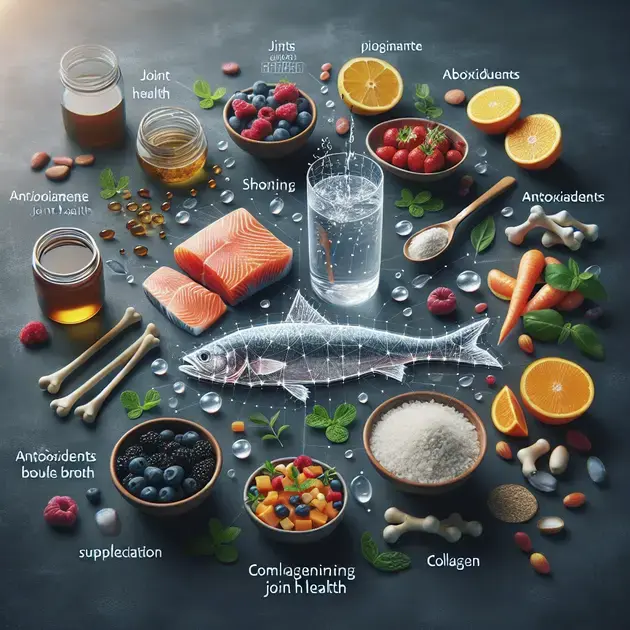Are you looking for ways to improve your joint health? One of the most effective methods is through a proper diet for joints. By incorporating specific foods and nutrients into your meals, you can support your joint function and reduce the risk of inflammation.
A diet rich in omega-3 fatty acids, antioxidants, and anti-inflammatory ingredients can play a significant role in maintaining healthy joints. Additionally, staying hydrated and maintaining a healthy weight are crucial aspects of joint health that can be supported through your dietary choices. Let’s explore the best foods and strategies to promote strong and pain-free joints.

Optimizing Your Joint Health with a Nutrient-Rich Diet
When it comes to optimizing your joint health, a nutrient-rich diet plays a crucial role in supporting and maintaining healthy joints. By incorporating specific key nutrients into your daily meals, you can promote joint function and reduce the risk of joint-related issues. Here’s a step-by-step guide on how to enhance your joint health through a nutrient-rich diet:
1. Include Omega-3 Fatty Acids:
Omega-3 fatty acids are known for their anti-inflammatory properties, which can help reduce joint pain and stiffness. Incorporate sources of omega-3s such as fatty fish (salmon, mackerel, sardines), flaxseeds, and chia seeds into your diet. You can track your omega-3 intake using apps like MyFitnessPal or Cronometer to ensure you’re meeting your daily requirements.
2. Vitamin D for Bone Health:
Vitamin D is essential for bone health and can help improve joint function. Spend time in the sun to allow your body to naturally produce vitamin D or consider taking supplements during winter months. Apps like Dminder can help you track your sun exposure and vitamin D levels to maintain optimal joint health.
3. Collagen-Rich Foods:
Collagen is a protein that supports joint flexibility and strength. Include collagen-rich foods like bone broth, chicken skin, and gelatin in your diet to promote joint health. You can find collagen supplements and recipes for collagen-rich meals on websites like Bulletproof or Vital Proteins.
4. Antioxidant-Rich Diet:
Antioxidants help reduce inflammation and protect joint tissues from damage. Incorporate colorful fruits and vegetables, green tea, and nuts into your meals to boost your antioxidant intake. Apps like Fooducate can help you identify antioxidant-rich foods at the grocery store.
5. Hydration and Joint Health:
Staying hydrated is essential for joint lubrication and overall joint health. Aim to drink an adequate amount of water throughout the day and consider consuming hydrating foods like cucumbers, watermelon, and oranges. Apps like Hydro Coach can help you track your daily water intake and remind you to stay hydrated for optimal joint function.

Maintaining Joint Health Through Proper Nutrition
Proper nutrition plays a crucial role in maintaining joint health and preventing conditions such as arthritis. By consuming a balanced diet rich in essential nutrients, you can support the health of your joints and reduce the risk of inflammation. Foods that are high in antioxidants, such as fruits and vegetables, can help protect the joints from oxidative stress and damage.
Omega-3 fatty acids, found in fatty fish like salmon and mackerel, are known for their anti-inflammatory properties and can help reduce joint pain and stiffness. Including these healthy fats in your diet can also support overall joint function and mobility. Additionally, incorporating sources of vitamin D, such as fortified dairy products or sunlight exposure, is essential for maintaining strong and healthy bones, which are essential for supporting the joints.
Another important aspect of maintaining joint health through nutrition is staying hydrated. Drinking an adequate amount of water each day can help keep the cartilage in your joints lubricated and prevent wear and tear. Proper hydration also supports the overall function of your joints and helps flush out toxins that can contribute to inflammation.
In conclusion, by focusing on a diet filled with nutrient-dense foods, you can promote joint health and reduce the risk of conditions that affect joint function. Incorporating a variety of foods rich in antioxidants, omega-3 fatty acids, and vitamins essential for bone health can go a long way in supporting your overall joint health and well-being.
Incorporating Anti-Inflammatory Foods for Joint Health
When it comes to promoting joint health, incorporating anti-inflammatory foods into your diet can make a significant difference. These foods can help reduce inflammation in the body, which is a common cause of joint pain and stiffness. Including foods like berries, which are rich in antioxidants, can help combat oxidative stress and protect the joints from damage.
Leafy greens such as spinach and kale are also excellent choices for reducing inflammation and supporting joint health. These vegetables are packed with nutrients that can help strengthen bones, improve joint flexibility, and reduce the risk of conditions like osteoporosis. Additionally, including spices like turmeric, which contains curcumin, a potent anti-inflammatory compound, can further enhance the benefits of your diet for joint health.
Incorporating sources of lean protein like chicken, turkey, or tofu can also play a role in supporting joint health. Protein is essential for muscle repair and development, which can help support the structures surrounding the joints and improve overall joint function. By including a variety of anti-inflammatory foods in your diet, you can help reduce inflammation, support joint health, and promote overall well-being.
Overall, by incorporating a wide range of anti-inflammatory foods into your diet, you can create a foundation for supporting joint health and reducing the risk of inflammatory conditions that affect joint function. Making small changes to your daily meals can have a big impact on the health of your joints and overall quality of life.
The Importance of Hydration for Joint Function
Hydration is a key component of maintaining healthy joints and supporting their overall function. Proper hydration helps keep the cartilage in your joints lubricated, which is essential for reducing friction and preventing pain and stiffness. Drinking an adequate amount of water each day can also help flush out toxins that can contribute to inflammation in the joints.
Dehydration can lead to a decrease in synovial fluid, which acts as a lubricant for the joints and helps absorb shock during physical activity. This can result in increased friction between the bones, leading to discomfort and reduced mobility. By staying properly hydrated, you can ensure that your joints remain well-lubricated and functioning optimally.
In addition to water, consuming hydrating foods such as fruits and vegetables can also contribute to your overall hydration levels. Foods like watermelon, cucumber, and celery have high water content and can help support joint function by providing additional hydration. Including these foods in your diet can complement your water intake and support the health of your joints.
Overall, maintaining proper hydration levels is essential for ensuring the health and function of your joints. By drinking an adequate amount of water, consuming hydrating foods, and taking steps to prevent dehydration, you can support the lubrication, shock absorption, and overall performance of your joints.
Conclusion
Proper nutrition is pivotal in maintaining joint health and warding off conditions like arthritis. Consuming a well-rounded diet rich in vital nutrients can bolster joint health, lessening the likelihood of inflammation. Antioxidant-rich foods, such as fruits and vegetables, offer protection to the joints against oxidative stress and harm.
Omega-3 fatty acids, prominent in fatty fish like salmon, possess anti-inflammatory properties that can alleviate joint pain and rigidity. By incorporating these healthy fats into your meals, you can enhance overall joint function and mobility. Moreover, integrating sources of vitamin D, like fortified dairy products or sunlight exposure, is crucial for sustaining sturdy and healthy bones, imperative for supporting the joints.
Staying hydrated is another key facet of preserving joint health through nutrition. Ensuring adequate water intake daily can maintain the cartilage in your joints lubricated, inhibiting wear and tear. Adequate hydration also bolsters overall joint functionality and aids in purging toxins that may foster inflammation.